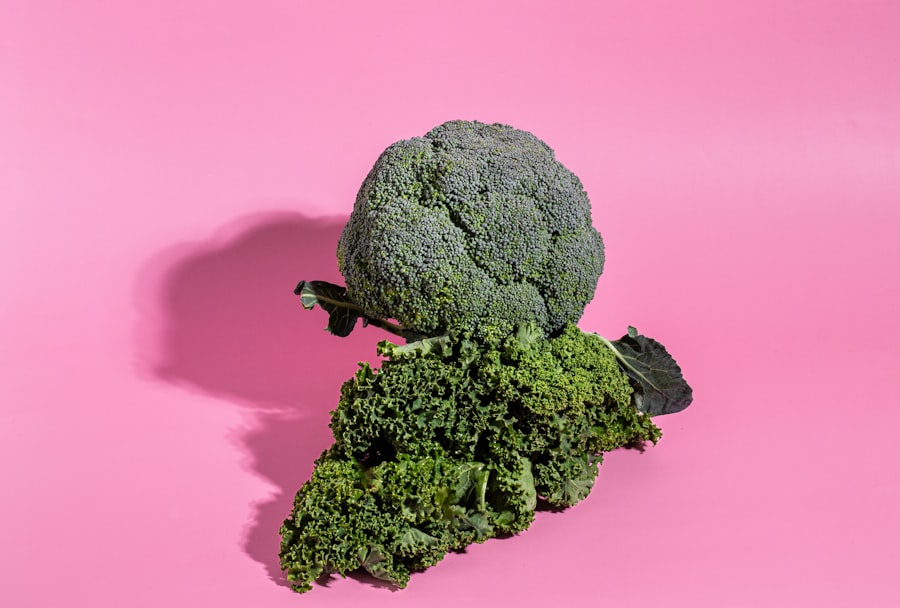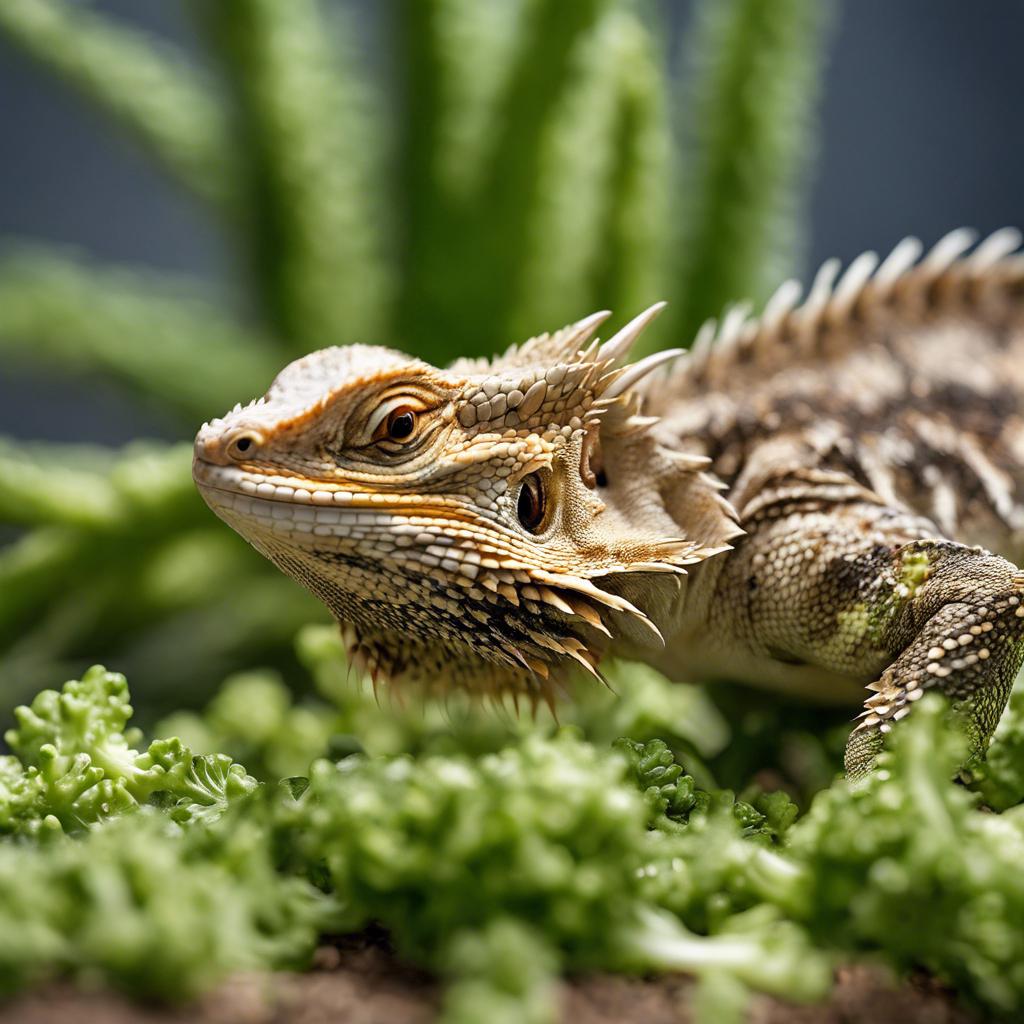Bearded dragons are popular reptile pets known for their unique appearance and docile nature. These lizards are native to Australia and have become increasingly popular as pets due to their friendly demeanor and relatively low maintenance requirements. However, it is important to note that proper nutrition is crucial for the health and well-being of bearded dragons.
Key Takeaways
- Bearded dragons are popular pets that require a balanced diet to maintain their health.
- Broccoli rabe is a leafy green vegetable that is high in nutrients and fiber.
- Bearded dragons can eat broccoli rabe in moderation as part of a varied diet.
- Feeding broccoli rabe to bearded dragons can provide benefits such as improved digestion and immune system function.
- However, overfeeding broccoli rabe can lead to health risks such as diarrhea and nutrient imbalances, so portion control is important.
Nutritional Needs of Bearded Dragons
Bearded dragons require a balanced diet that consists of a variety of nutrients to thrive. These nutrients include protein, calcium, vitamins, and minerals. Protein is essential for growth and development, while calcium is necessary for strong bones and overall health. Vitamins and minerals play a vital role in various bodily functions and help support the immune system.
A balanced diet for bearded dragons typically consists of a combination of insects, vegetables, and fruits. It is important to provide a variety of foods to ensure that all nutritional needs are met. Feeding a monotonous diet can lead to deficiencies or imbalances in essential nutrients.
What is Broccoli Rabe?
Broccoli rabe, also known as rapini, is a leafy green vegetable that belongs to the Brassica family. It has long, thin stalks with small broccoli-like florets and leaves that resemble mustard greens. Broccoli rabe has a slightly bitter taste and is commonly used in Italian cuisine.
In terms of nutritional value, broccoli rabe is an excellent source of vitamins A, C, and K. It also contains significant amounts of calcium, iron, and fiber. Compared to regular broccoli, broccoli rabe has a higher concentration of these nutrients.
Can Bearded Dragons Eat Broccoli Rabe?
Yes, bearded dragons can eat broccoli rabe in moderation. However, it is important to note that while broccoli rabe can be a nutritious addition to their diet, it should not be the sole source of vegetables. Variety is key when it comes to providing a balanced diet for bearded dragons.
Benefits of Feeding Broccoli Rabe to Bearded Dragons
Feeding broccoli rabe to bearded dragons can provide several benefits. Firstly, it is a great source of vitamins A, C, and K, which are essential for their overall health and immune system function. These vitamins play a crucial role in maintaining healthy skin, eyesight, and bone development.
Additionally, broccoli rabe contains calcium, which is vital for the proper growth and maintenance of bearded dragon's bones and teeth. Calcium deficiency can lead to metabolic bone disease, a serious condition that can cause deformities and even death in reptiles.
Furthermore, the fiber content in broccoli rabe can aid in digestion and prevent constipation in bearded dragons. It also promotes a healthy gut flora, which is important for their overall well-being.
Risks of Feeding Broccoli Rabe to Bearded Dragons

While broccoli rabe can be beneficial for bearded dragons, there are some potential risks to consider. One of the main concerns is the high oxalate content in broccoli rabe. Oxalates can bind to calcium and form crystals, which can lead to the development of kidney stones in reptiles.
To minimize this risk, it is important to provide a varied diet and not rely solely on broccoli rabe as a source of vegetables. Additionally, it is recommended to lightly steam or blanch the broccoli rabe before feeding it to your bearded dragon. This can help reduce the oxalate content and make it easier for them to digest.
How to Prepare Broccoli Rabe for Bearded Dragons
To prepare broccoli rabe for bearded dragons, start by washing it thoroughly to remove any dirt or pesticides. Then, trim off any tough stems or leaves. It is recommended to lightly steam or blanch the broccoli rabe to make it easier for your bearded dragon to digest. This can be done by placing the vegetable in a steamer basket or boiling it for a few minutes until it becomes tender.
After steaming or blanching, allow the broccoli rabe to cool down before serving it to your bearded dragon. Cut it into small, bite-sized pieces to make it easier for them to eat. Be sure to remove any uneaten portions after a few hours to prevent spoilage.
Feeding Frequency and Portion Control
When it comes to feeding broccoli rabe to bearded dragons, moderation is key. It should be offered as part of a varied diet and not as the main source of vegetables. A good rule of thumb is to offer vegetables, including broccoli rabe, every other day, while insects should be provided daily.
In terms of portion control, bearded dragons should be offered an amount of vegetables that is roughly the size of their head. This ensures that they are getting enough nutrients without overfeeding them.
Other Vegetables Bearded Dragons Can Eat
In addition to broccoli rabe, there are several other vegetables that bearded dragons can safely consume. Some examples include collard greens, mustard greens, dandelion greens, kale, and butternut squash. These vegetables are rich in vitamins and minerals and can provide a variety of nutrients to support the health of your bearded dragon.
It is important to note that not all vegetables are safe for bearded dragons. Some vegetables, such as spinach and iceberg lettuce, should be avoided due to their high oxalate content or low nutritional value.
Proper Bearded Dragon Care and Nutrition
Proper nutrition is essential for the health and well-being of bearded dragons. A balanced diet that includes a variety of nutrients is crucial for their growth, development, and overall health. While broccoli rabe can be a nutritious addition to their diet, it should not be the sole source of vegetables.
It is important to research and consult with a veterinarian specializing in reptiles before introducing new foods to your bearded dragon's diet. This ensures that you are providing the best care possible for your scaly friend and meeting their specific nutritional needs. By providing a balanced diet and proper care, you can help your bearded dragon live a long and healthy life.
If you're wondering whether bearded dragons can eat broccoli rabe, you may also be interested in learning about the safety of other foods for these reptiles. Reptile Wizard has a helpful article on their website that discusses whether bearded dragons can eat black beans. To find out more about this topic, you can check out their article here. It's always important to ensure that you're providing your bearded dragon with a balanced and appropriate diet to keep them healthy and happy.
FAQs
What is broccoli rabe?
Broccoli rabe, also known as rapini, is a leafy green vegetable that is closely related to turnips and mustard greens. It has a slightly bitter taste and is commonly used in Italian and Chinese cuisine.
Can bearded dragons eat broccoli rabe?
Yes, bearded dragons can eat broccoli rabe in moderation. It is a good source of vitamins and minerals, but should not make up a large portion of their diet.
What are the nutritional benefits of broccoli rabe for bearded dragons?
Broccoli rabe is a good source of vitamin A, vitamin C, calcium, and iron, which are all important for the health of bearded dragons.
How should broccoli rabe be prepared for bearded dragons?
Broccoli rabe should be washed thoroughly and chopped into small pieces before being fed to bearded dragons. It can be served raw or lightly steamed.
Can feeding too much broccoli rabe be harmful to bearded dragons?
Yes, feeding too much broccoli rabe can be harmful to bearded dragons. It contains oxalates, which can bind to calcium and prevent it from being absorbed by the body. This can lead to metabolic bone disease if not balanced with other calcium-rich foods.

